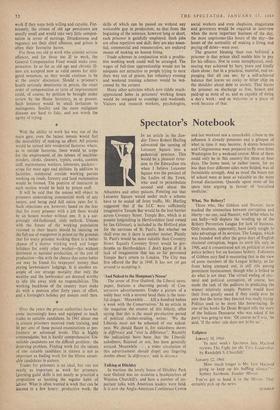What, No Bribery?
Those who, like Gibbon and Namier, have marked the connection between corruption and liberty—no one, said Namier, will bribe when he can bully—will deplore the winding up of the Bribery Prevention League for lack of business. Only madmen, apparently, have lately sought to take advantage of its services. The League, which was founded well after the great days of English electoral corruption, began its stern life only in 1906, and it concentrated not on political or even police bribery but on business bribery. Followers of Gibbon may find it reassuring that in the view of some members of the League bribery, so far from being stamped out, is still rife among prominent businessmen, though who is bribed to do what is not clear. The virtual ending of elec- toral and political corruption, of course, has made the task of the pollsters in predicting the winner relatively simple. Punters would have their lives greatly eased if they could ever be sure that the horse they fancied was really trying. Politics used to be more like horse-racing. In one of his books Sir Denis Brogan tells the story of the Indiana Democrat who was asked if his party was going to win: 'Of course we'll win,' he said, 'if the other side does not bribe us.' ,


































 Previous page
Previous page